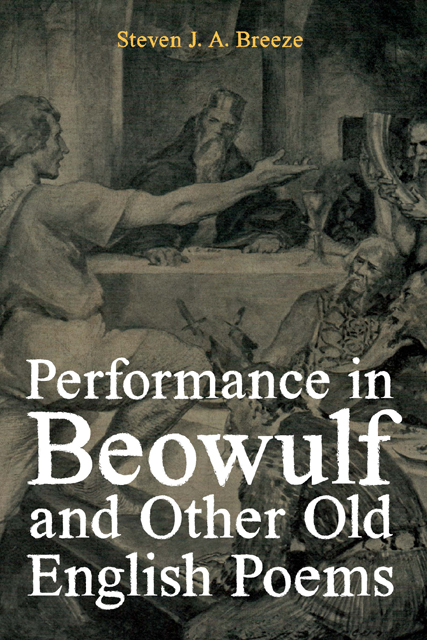Book contents
- Frontmatter
- Dedication
- Contents
- List of Illustrations and Tables
- Acknowledgements
- List of Abbreviations
- Poem Titles, Orthography, Editions, and Translations
- Introduction: Realising the Intangible
- 1 Instruments of the Poet: Exploiting the Old English Lexis
- 2 Multiformity and the Orality of Associative, Architectonic Poetics
- 3 Providence and Pleasure: Performance as Symbol
- 4 Storytelling in Beowulf and Meta-storytelling in Andreas
- 5 Wisdom and Power: Philosophies of Performance
- 6 Theme Songs: An English Tradition of Performance?
- 7 The Lure of the Lyre: Interpretation, Reenactment, and the Corpus
- Conclusion: ‘Poetic Performance’
- Bibliography
- Index
- Anglo-Saxon Studies
4 - Storytelling in Beowulf and Meta-storytelling in Andreas
Published online by Cambridge University Press: 20 December 2022
- Frontmatter
- Dedication
- Contents
- List of Illustrations and Tables
- Acknowledgements
- List of Abbreviations
- Poem Titles, Orthography, Editions, and Translations
- Introduction: Realising the Intangible
- 1 Instruments of the Poet: Exploiting the Old English Lexis
- 2 Multiformity and the Orality of Associative, Architectonic Poetics
- 3 Providence and Pleasure: Performance as Symbol
- 4 Storytelling in Beowulf and Meta-storytelling in Andreas
- 5 Wisdom and Power: Philosophies of Performance
- 6 Theme Songs: An English Tradition of Performance?
- 7 The Lure of the Lyre: Interpretation, Reenactment, and the Corpus
- Conclusion: ‘Poetic Performance’
- Bibliography
- Index
- Anglo-Saxon Studies
Summary
Joseph Harris and Karl Reichl maintain that ‘all successful communications in Beowulf are oral, and the many formal speeches, boasts, flytings, and so on might, in real life, have been “performances” by modern standards.’ Taking this view, then among such communications the principal mode of performance in Beowulf is storytelling. It is the kind of performance represented most comprehensively in the poem, and the only one indisputably performed by named, principal characters. Whereas other performance acts represented in Beowulf may not have taken the form of poetry in the Germanic alliterative long line, one aspect of storytelling’s mode is clear: because it occurs within speeches, it is thus demonstrably, if fictively, executed in that poetic form.
Storytelling’s primacy results partly from the fact that it is suited to Beowulf’s psychological focus. Michael Lapidge argues that ‘Beowulf is very much taken up with reflection – on human activity and conduct, on the transience of human life’, and that ‘a central concern of the Beowulf poet … is with human perception of the external world and with the workings of the human mind’. In Beowulf, storytelling is the most prevalent and detailed method of expressing this reflection and perception. This chapter explores the representation of storytelling in the poem, arguing that speech acts by certain characters – often but not always named protagonists – regularly perform a function like that of the unnamed, generic artistic figures discussed in Chapter 2. That is, they are tools enabling the poet to weave digressive historical or legendary material, as well as matter related to the poem’s events, into the narrative, and they also serve to comment on cultural matters. Storytellers do this in a much more detailed way than the generic figures, however, and can usefully be seen as exemplars of the poet’s rhetorical dexterity. The latter part of the chapter considers storytelling in Andreas, a narrative poem containing intriguing parallels with Beowulf, and possibly influenced by that poem. The Andreas poet, using more overtly literate sources, shifts the function of storytelling within a more overtly Christian context, creating a work in which storytelling is conceived of as a vital element of Christian faith, transmission, and communication.
- Type
- Chapter
- Information
- Performance in Beowulf; and other Old English Poems , pp. 119 - 143Publisher: Boydell & BrewerPrint publication year: 2022

